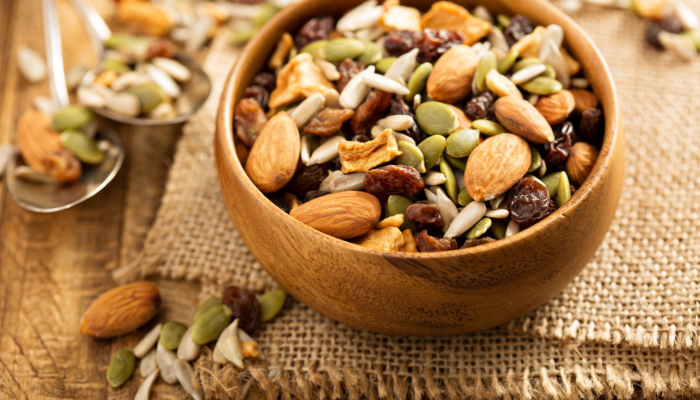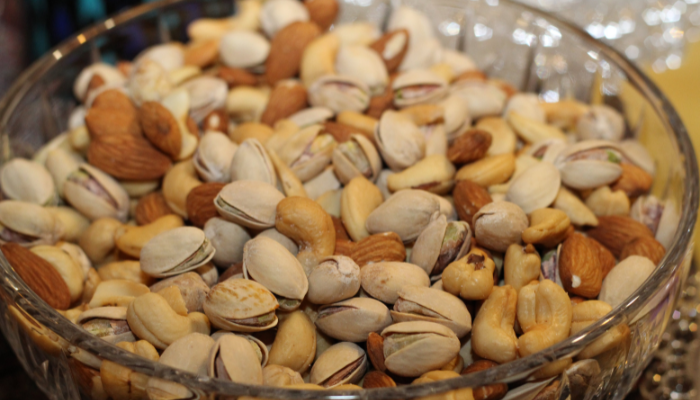Dry Fruits


The Ultimate Guide to Dry Fruits: Nutrition, Health Benefits, and Tasty Ways to Enjoy
Dried fruits, also known as dry fruits, are fruits that have had almost all of their water content removed through drying methods. They are packed with essential nutrients and concentrated flavors, making them a healthy and delicious snack. This comprehensive guide will explore the nutrition, health benefits, and tasty ways to enjoy a wide variety of dried fruits.
Overview of Common Dry Fruits
Many different types of fruits can be dried, but some more common varieties include:
Dried Apricots
These sweet and tart fruits are rich in vitamin A and provide fiber, potassium, and antioxidants. Drying concentrates their flavor.
Dried Dates
Available in several varieties, these honey-sweet fruits are high in fiber, potassium, magnesium, copper, and manganese. Their sticky texture gives great taste and addition to dry fruits family.
Prunes
Made from dried plums, prunes contain high amounts of nutrients like vitamin K, magnesium, potassium, and antioxidants. They have a deep, molasses-like taste.
Raisins
Produced by drying grapes, raisins have a wrinkled texture and sweet flavor. They provide fiber, potassium, iron, and beneficial plant compounds.
Dried Figs
With a dense, chewy texture and nutty flavor, figs offer high fiber and essential minerals like calcium, magnesium, and potassium. They are naturally very sweet.
Dried Cranberries
Tart and colorful, dried cranberries are a good source of vitamin C, manganese, and antioxidants. Their strong tartness pairs well with nutty flavors.
Nutritional Benefits of Dried Fruits
Dried fruits contain concentrated amounts of many important vitamins, minerals, and other nutrients:
Fiber
Since the water is removed, the fiber gets concentrated in dried fruits. Fiber promotes healthy digestion and may help lower cholesterol and blood sugar levels. Just 1/4 cup of dried apricots contains over 3 grams of fiber.
Potassium
Most dried fruits contain high amounts of potassium which helps control blood pressure and heart function. Dried apricots have more than 1,100 mg of potassium per cup.
Vitamin A
Many bright orange and yellow dried fruits are rich sources of vitamin A which supports eye health and a strong immune system. A 1/4 cup of dried apricots provides over 30% of the recommended daily vitamin A.
Iron
Needed to transport oxygen in the blood, iron is found in high amounts in certain dried fruits like raisins, prunes, and apricots. Just 10 dried apricot halves provide 10% of the iron you need each day.
Vitamin K
Important for proper blood clotting, vitamin K is abundant in prunes and dried figs. Eating 1/2 cup of prunes gives you 15% of the recommended daily vitamin K intake.
Antioxidants
Drying fruits preserves their beneficial plant compounds and antioxidants which can lower inflammation and oxidative stress. Dried cranberries, plums, apples, and apricots are particularly high in antioxidants.
Overall, the concentration of vitamins, minerals, fiber, and other beneficial phytonutrients make dried fruits a nutritionally dense choice. Mixing a serving with nuts or seeds can further boost the nutrient content.
Potential Health Benefits of Dry Fruits
Research shows that incorporating dry fruits into your diet can provide many health advantages:
Improved Digestion
The fiber found in dried fruits can promote regular bowel movements and improve conditions like constipation. The fiber feeds the healthy bacteria in your gut as well to support digestive health.
Lower Cholesterol
Several studies indicate that frequently eating dried fruit may help decrease LDL “bad” cholesterol levels due to their fiber content and bioactive compounds. They also contain no cholesterol.
Reduced Heart Disease Risk
The potassium in dried fruits play a role in lowering blood pressure which reduces the risk of heart attack and stroke. Their antioxidants also protect heart health.
Stable Blood Sugar Levels
Despite their sweet taste, dried fruits have a low glycemic index and do not spike blood sugar rapidly. Their fiber slows the absorption of sugars.
Healthy Aging
The antioxidants in dried fruits help fight cellular damage from free radicals and may lower risk of age-related diseases. Their anti-inflammatory properties also promote healthy aging.
Stronger Bones and Teeth
Dried apricots, figs, and plums provide calcium and vitamin K which are important for building and maintaining strong bones and teeth as you age.
While they are healthy in moderation, dried fruits also have high natural sugar content. Portion control is important, especially for people with diabetes.
Tips for Purchasing and Storing Dried Fruit
When shopping for high-quality dried fruit:
- Look for unsweetened varieties without added oils, sugars, or preservatives.
- Check the ingredient list and choose those with only the stated fruit as the ingredient.
- Seek out organic dried fruits when possible to reduce pesticide exposure.
- Buy fruits without signs of moisture, mold or crystallized sugar which diminishes freshness.
- Purchase small quantities and look for loose dried fruits sold in bulk bins to ensure freshness.
- Store opened dried fruit packages in a cool, dry place or refrigerate for up to 6 months.
- Leave unopened dried fruit packages in a cool cupboard away from light which can degrade nutrients over time.
Choosing high-quality, additive-free dried fruits gives you the most nutritional benefits. Proper storage keeps them fresh for longer.
Creative and Healthy Ways to Eat Dried Fruits
Beyond snacking straight from the package, there are many tasty ways to incorporate dried fruits into your meals and recipes:
- Add dried cranberries, apricots, or raisins to your breakfast cereal, oatmeal, or yogurt.
- Mix chopped dried fruits with nuts like almonds or walnuts for a high protein and fiber snack.
- Make homemade trail mix with dried fruits, nuts, seeds, coconut flakes, and whole grain cereal.
- Toss dried fruits into green, grain, pasta, or fruit salads for extra flavor and nutrition.
- Bake dried fruits like apricots, cranberries, apples or mango into muffins, breads, cookies or bars.
- Puree soaked prunes or dates into a paste for using in smoothies, energy bites, or brownies.
- Make chutneys or salsas by simmering dried fruits like apricots, cranberries, or mangoes in vinegar and spices.
- Create a Fruity Rice Pilaf by simmering rice with dried apricots, cranberries, and seasonings like garlic and thyme.
- Grill meat kabobs alternating with softened dried fruits like apricots, pineapple, apples or pears.
- Replace raisins with other dried fruits like blueberries or cherries when making bread or muffin recipes.
Allowing dried fruits to plump in hot water or juice before using can intensify their flavor. Combining them with nuts, spices, cereals and other ingredients balances their sweetness.

Common Questions About Dried Fruits
Here are answers to some frequently asked questions about dried fruits:
Are dried fruits just as nutritious as fresh fruits?
Dried fruits contain all the same nutrients, only concentrated into a smaller serving since the water content is reduced. Their vitamins and minerals are very dense.
Is it okay to eat dried fruits daily?
Yes, enjoying a serving of dried fruit daily can be part of a healthy diet, providing essential nutrients. Focus on variety and keep portions small since they are calorie dense.
Can dried fruits cause weight gain?
Dried fruits are high in sugar and calories by volume so portions should be monitored. As part of an overall healthy diet that meets your calorie needs, they do not directly cause weight gain.
Do dried fruits expire or go bad?
Properly stored, dried fruits can last 6-12 months. Over time, they lose flavor and nutrients. If they become sticky, crystallized, or smell rotten, they have spoiled and should be discarded.
Should you drink water after eating dried fruits?
Water helps digest any foods and prevent dehydration. However, you do not need to drink water specifically after eating dried fruits. They will not “soak up” all the water in your body.
Can dogs or cats eat dried fruits?
Occasional small pieces of dried apricot or mango are safe for dogs. However, avoid grapes or raisins which can cause kidney damage. Cats should avoid dried fruit due to their high sugar content.
While versatile and convenient, dried fruits are best enjoyed in moderation to limit their sugar content. Select high-quality dried fruits and pair with nuts, seeds, spices or grains for a nutritious, well-balanced snack.




